THERE ARE 700,000 ILLEGAL SETTLERS ***
IN THE WEST BANK & EAST JERUSALEM
The Canadian Press
Thu, May 16, 2024
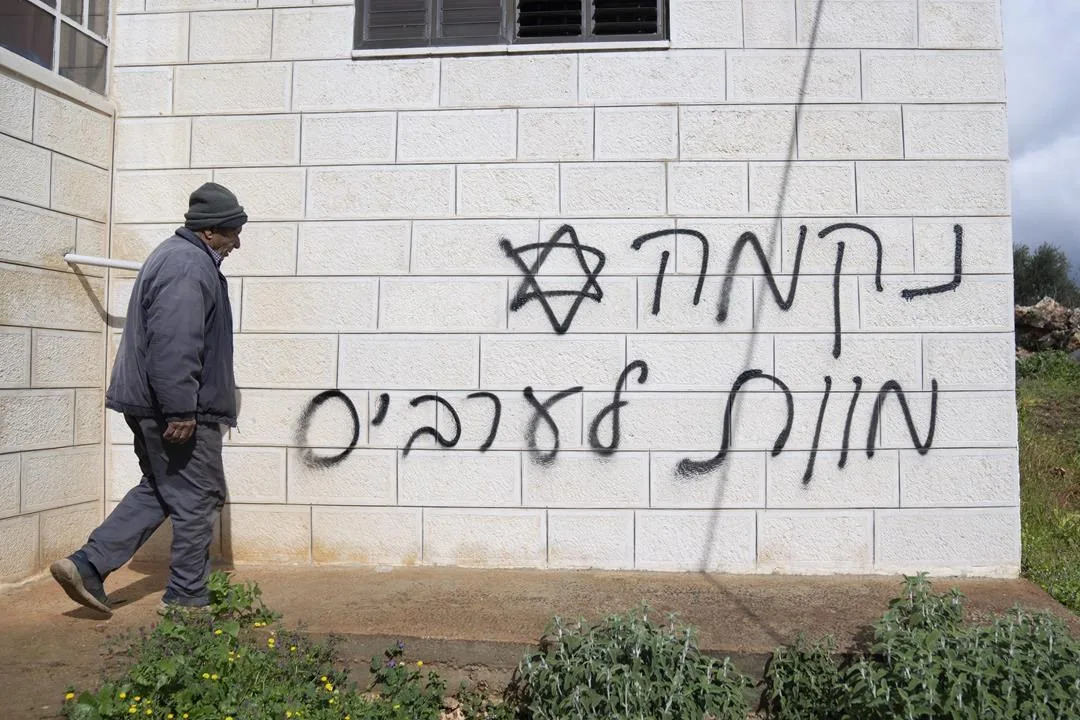
OTTAWA — Foreign Affairs Minister Mélanie Joly is imposing sanctions on Israelis she accuses of "extremist settler violence" in the West Bank, three months after pledging to do so.
"While I was in the region recently, I heard directly from families that have been forced to leave their homes and farming lands as a direct result of violence and threats by extremist settlers," Joly wrote in a statement.
"With these measures, we are sending a clear message that acts of extremist settler violence are unacceptable and that perpetrators of such violence will face consequences."
Joly originally promised these sanctions in February, and calls them "a significant step" in Canada's approach to the region, as it tries to maintain the prospect of a two-state solution involving a Palestinian country living in peace next to Israel.
Israel has occupied the West Bank, which is separate from the Gaza Strip, since 1967, and settlers have increasingly built communities that Canada and many other countries say violate international law.
An attack last October by Hamas in Gaza prompted Israel to bombard that territory, and the United Nations says there has been a sharp uptick in West Bank settlers attacking Palestinians.
The sanctions announced Thursday apply to four men Ottawa accuses of "violent and destabilizing actions against Palestinian civilians and their property in the West Bank." All four were listed by the U.S. and U.K. earlier this year.
They include David Chai Chasdai, whom the U.S. State Department has accused of leading a rampage in which multiple vehicles and buildings were set on fire and one civilian was killed.
Yinon Levi has regularly led settlers to assault Palestinian and Bedouin civilians, Washington says, setting their fields on fire and threatening more violence if they don't leave.
Moshe Sharvit "repeatedly harassed, threatened, and attacked Palestinian civilians and Israeli human rights defenders," according to the State Department, including making 100 Palestinians flee after ordering them to leave.
Zvi Bar Yosef was accused by Washington of "repeated violence against Palestinians" and blocking access to their lands.
Prime Minister Justin Trudeau has said that Canada will no longer automatically vote against most UN resolutions targeting Israel, because the right-wing coalition government led by Prime Minister Benjamin Netanyahu has been thwarting efforts toward a two-state solution.
The Israeli Embassy in Ottawa has been asked for comment.
This report by The Canadian Press was first published May 16, 2024.
Dylan Robertson, The Canadian Press
Canada sanctions 'extremist' Israeli settlers
CBC
Thu, May 16, 2024
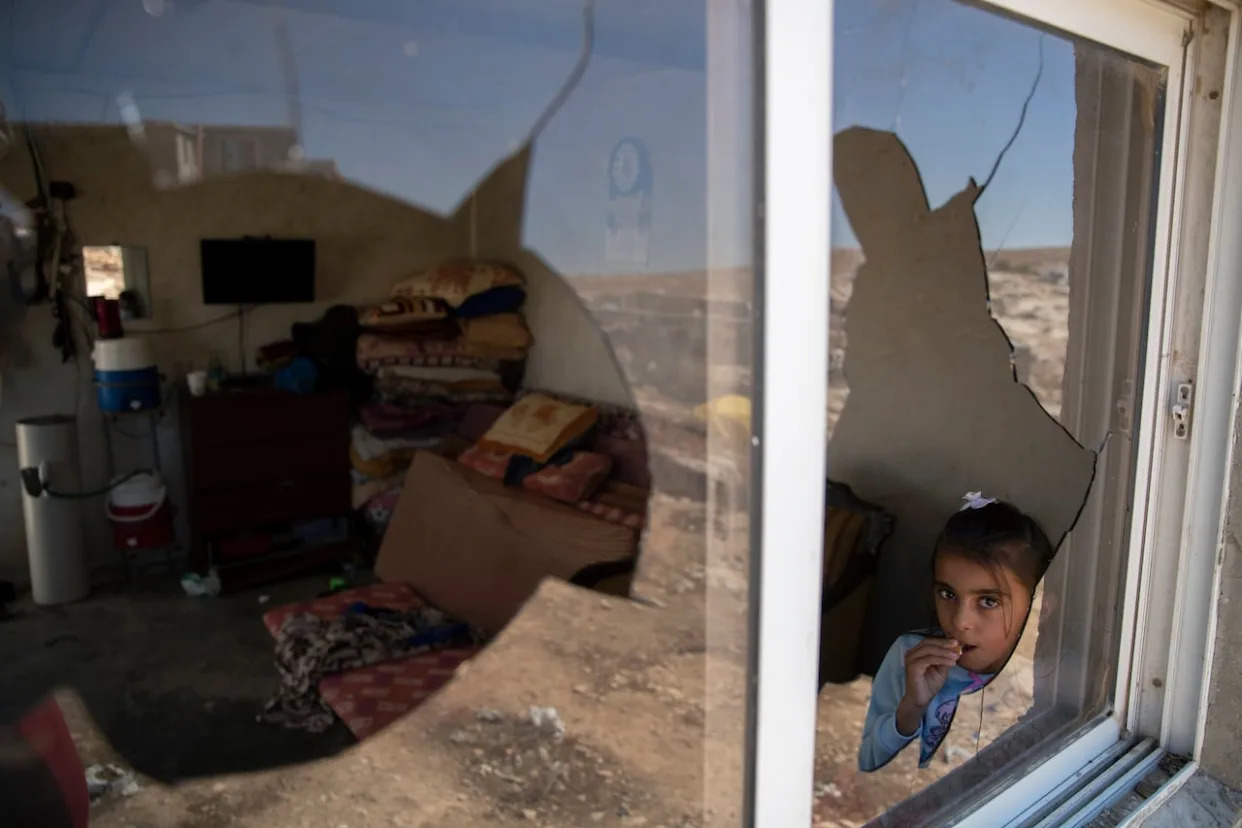
A Palestinian girl looks through her family home's shattered window after a settlers' attack in the West Bank village of al-Mufagara, near Hebron, on Thursday, Sept. 30, 2021. (Nasser Nasser/Associated Press - image credit)
Canada is imposing sanctions on "extremist" Israeli settlers in the West Bank, Global Affairs Canada announced Thursday.
"The sanctions are a response to the grave breach of international peace and security posed by their violent and destabilizing actions against Palestinian civilians and their property in the West Bank," Global Affairs said in a news release.
Canada is sanctioning four people, the department said: David Chai Chasdai, Yinon Levi, Zvi Bar Yosef and Moshe Sharvit. Global Affairs Canada said the four have engaged in violence against Palestinian civilians and their property.
The four men are among the eight people the U.S. sanctioned earlier this year. Canada's sanctions come months after Foreign Affairs Minister Mélanie Joly first said the government would be imposing them.
The U.S. government also sanctioned the two outposts the settlers have established: Zvi's Farm, northwest of the West Bank's main city Ramallah, and Moshe's Farm in the Jordan Valley. It also sanctioned agricultural enterprises run out of the outposts. Canada has sanctioned only individuals.
"With these measures, we are sending a clear message that acts of extremist settler violence are unacceptable and that perpetrators of such violence will face consequences," Joly said in a media statement Thursday.
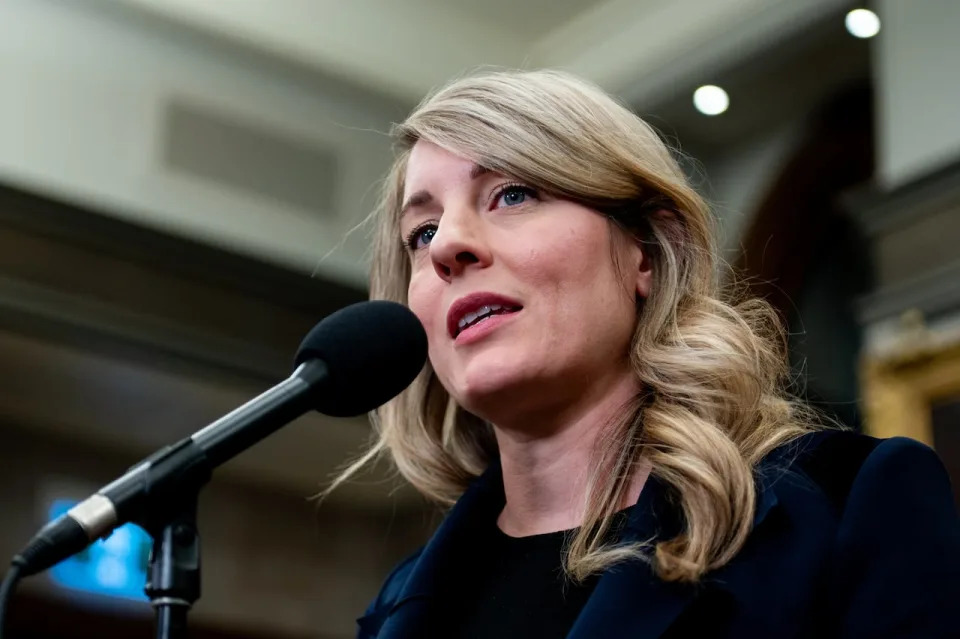
Minister of Foreign Affairs Melanie Joly speaks to reporters in the Foyer of the House of Commons on Parliament Hill in Ottawa, on Monday, March 18, 2024.
Minister of Foreign Affairs Melanie Joly speaks to reporters in the foyer of the House of Commons on Parliament Hill in Ottawa, on Monday, March 18, 2024. (Spencer Colby/The Canadian Press)
The United Nations has reported an escalation in settler attacks in the Palestinian territories since the Oct. 7 attacks.
Acts of violence by settlers and moves to dispossess Palestinians of their property were on the rise before the attacks and followed the election of the current Netanyahu government at the end of 2022.
That government is dominated by pro-settler parties and includes a number of West Bank settlers in its cabinet. Prominent members of the government have visited and spoken in support of the outposts where the sanctioned settlers live.
About 4,000 Palestinians were displaced from their land and homes in 2023, according to the UN Office for the Coordination of Humanitarian Affairs. It's the highest number recorded in the past 20 years.
"Attacks by extremist Israeli settlers — a long-standing source of tension and conflict in the region — have escalated alarmingly in recent months," the Global Affairs statement said. "This has undermined the human rights of Palestinians, prospects for a two-state solution and posed significant risks to regional security."
Under the Fourth Geneva Convention, it is considered a war crime for a country to move its own population into territory occupied in war. Violations of the Geneva Convention are also offences under Canada's Crimes Against Humanity and War Crimes Act.
Historically, however, little action has been against the more than 700,000 Israeli settlers in the West Bank, who include a significant number of Canadian citizens.
Earlier this year, Canada sanctioned nearly a dozen people connected to Hamas's Oct 7 attack on Israel, including Hamas leaders. It was the first time Canada had imposed individual sanctions on non-state actors.
Israel ‘needs to do more’ to stop settlers sacking Gaza aid trucks, US says
John Bowden and Andrew Feinberg
THE INDEPENDENT
Thu, May 16, 2024
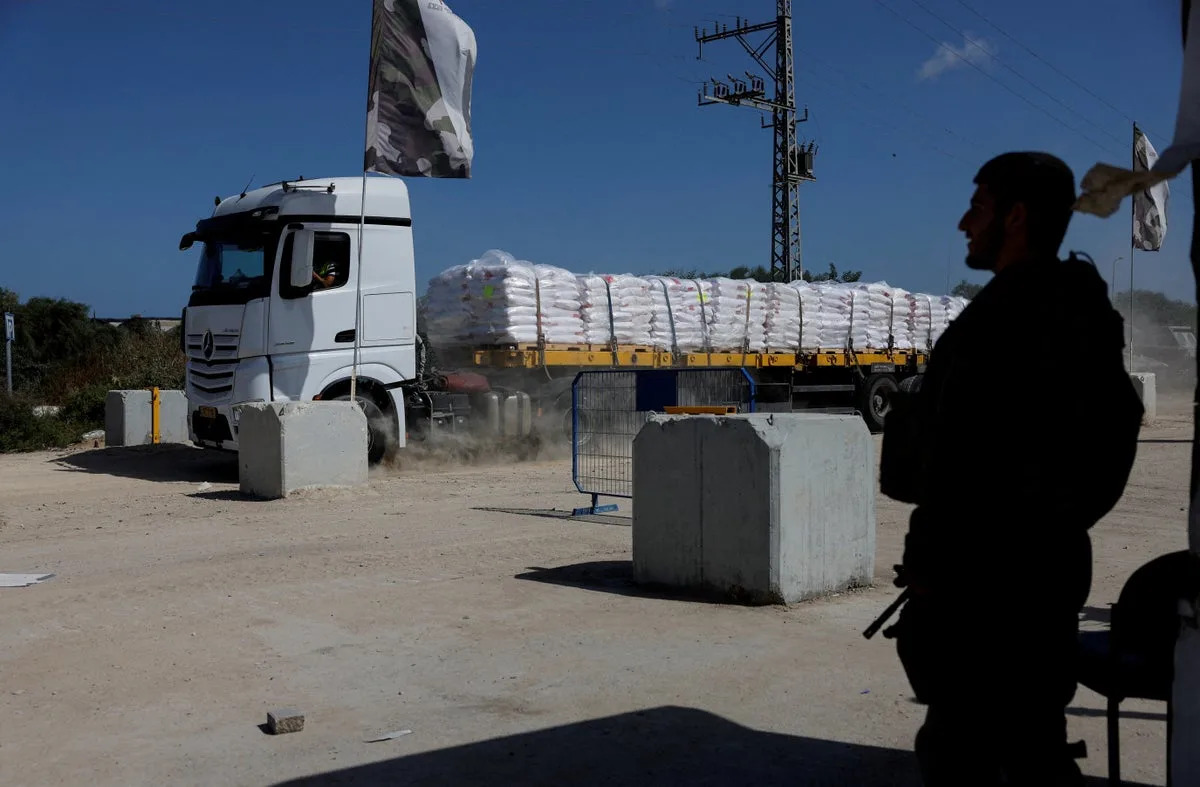
Israeli officials “need to do more” to stop settlers attacking trucks loaded with food, water and other critical supplies from entering Gaza, a State Department spokesman said on Thursday.
The remarks came after videos emerged on X/Twitter showing Israeli settlers destroying packages of humanitarian assistance held on trucks bound for Gaza.
Vedant Patel, state spokesperson, said that he could not verify the fate of the trucks seen in the video. But he added that Israeli officials “need to do more to hold actors like this accountable when action is taken that is inconsistent with what we know is important, which is getting more humanitarian aid into Gaza”.
“What I can say...humanitarian aid must not, and can not, be restricted, stopped or interefered with,” he said.
White House spokeswoman Karine Jean-Pierre also addressed the issue of aid convoys being blocked or harrassed on Thursday. “We remain concerned about ongoing limited operations at the Rafah boarding crossing,” she said.
“This level of aid remains insufficient,” said Jean-Pierre at her daily briefing. “And we want to continue to press Israel to increase the level of assistant moving into Gaza. I cannot speak to the prime minister or domestic politics that is for him to speak to, what I can speak to is what we have been working on doing, and how much we understand the importance of getting that humanitarian aid in. And that's what we've been doing.”
A video posted by Axios’s Barak Ravid on Twitter on Monday showed at least a dozen if not more Israelis throwing packages appearing to contain bottled water on the ground, smashing them, as they crossed from the West Bank into Israel, bound for Gaza. Other videos and news reports, such as one from Haaretz this week, have also indicated that truck drivers have been subject to assaults for participating in aid convoys.
The US continues to insist that these incidents (and the inability or unwillingness of Israeli security forces to stop them from occurring) do not amount to officially-sanctioned efforts by Israel’s government to restrict or halt the flow of humanitarian aid into Gaza, which would violate international law. But the State Department in particular has faced heavy criticism for that finding, in particular following the publication of a report last week which also found that in some “instances” Israeli forces could be reasonably found to have violated international humanitarian assistance laws.
In general, the Biden administration continues to tread a fine line on the issue of aid to Gaza and Israel’s treatment of Palestinian civilians. The US has repeatedly fought back against accusations that Israel (with US assistance) is committing a genocide in Gaza, and rejected the authority of an International Criminal Court (ICC) investigation into the matter. At the same time, White House and State Department officials have repeatedly publicly pressed Israel’s government to increase aid crossings and to take further steps aimed at protecting civilians from harm, while condemning rhetoric from rightwing Israeli politicians embracing the destruction of Gaza.
President Joe Biden drew his red line for Israel’s conduct in a recent interview with CNN, saying that he would halt the transfer of some weapons to Israel should a major military assault against the city of Rafah in southern Gaza begin. While violence has been reported in the area, State Department officials have told reporters that the Israeli operations in the area are limited and have thus far avoided population centres, skirting the president’s threat.
Israeli officials have pushed back against the US president’s warning and have vowed to move forward with an invasion of Rafah, where more than one million refugees have fled fighting that has utterly leveled large parts of Gaza’s north. More than 35,000 people, with over half being children, are thought to have been killed since the fighting began last year following a deadly Hamas terrorist attack in Israel that killed 1,152 people and resulted in hundreds being taken hostage by militants.
Over the weekend, Secretary of State Antony Blinken was questioned about the US’s handling of relations with Israel during an appearance on NBC’s Meet the Press and denied that the US was avoiding more serious criticism for fear of angering a US ally.
“We don’t have double standards,” Blinken said.“We treat Israel, one of our closest allies and partners, just as we would treat any other country, including in assessing something like international humanitarian law, and its compliance with that law.”

‘Barbaric’: Palestinian lorry drivers recount settlers’ attack on Gaza aid convoy
Thu, May 16, 2024

Israeli officials “need to do more” to stop settlers attacking trucks loaded with food, water and other critical supplies from entering Gaza, a State Department spokesman said on Thursday.
The remarks came after videos emerged on X/Twitter showing Israeli settlers destroying packages of humanitarian assistance held on trucks bound for Gaza.
Vedant Patel, state spokesperson, said that he could not verify the fate of the trucks seen in the video. But he added that Israeli officials “need to do more to hold actors like this accountable when action is taken that is inconsistent with what we know is important, which is getting more humanitarian aid into Gaza”.
“What I can say...humanitarian aid must not, and can not, be restricted, stopped or interefered with,” he said.
White House spokeswoman Karine Jean-Pierre also addressed the issue of aid convoys being blocked or harrassed on Thursday. “We remain concerned about ongoing limited operations at the Rafah boarding crossing,” she said.
“This level of aid remains insufficient,” said Jean-Pierre at her daily briefing. “And we want to continue to press Israel to increase the level of assistant moving into Gaza. I cannot speak to the prime minister or domestic politics that is for him to speak to, what I can speak to is what we have been working on doing, and how much we understand the importance of getting that humanitarian aid in. And that's what we've been doing.”
A video posted by Axios’s Barak Ravid on Twitter on Monday showed at least a dozen if not more Israelis throwing packages appearing to contain bottled water on the ground, smashing them, as they crossed from the West Bank into Israel, bound for Gaza. Other videos and news reports, such as one from Haaretz this week, have also indicated that truck drivers have been subject to assaults for participating in aid convoys.
The US continues to insist that these incidents (and the inability or unwillingness of Israeli security forces to stop them from occurring) do not amount to officially-sanctioned efforts by Israel’s government to restrict or halt the flow of humanitarian aid into Gaza, which would violate international law. But the State Department in particular has faced heavy criticism for that finding, in particular following the publication of a report last week which also found that in some “instances” Israeli forces could be reasonably found to have violated international humanitarian assistance laws.
In general, the Biden administration continues to tread a fine line on the issue of aid to Gaza and Israel’s treatment of Palestinian civilians. The US has repeatedly fought back against accusations that Israel (with US assistance) is committing a genocide in Gaza, and rejected the authority of an International Criminal Court (ICC) investigation into the matter. At the same time, White House and State Department officials have repeatedly publicly pressed Israel’s government to increase aid crossings and to take further steps aimed at protecting civilians from harm, while condemning rhetoric from rightwing Israeli politicians embracing the destruction of Gaza.
President Joe Biden drew his red line for Israel’s conduct in a recent interview with CNN, saying that he would halt the transfer of some weapons to Israel should a major military assault against the city of Rafah in southern Gaza begin. While violence has been reported in the area, State Department officials have told reporters that the Israeli operations in the area are limited and have thus far avoided population centres, skirting the president’s threat.
Israeli officials have pushed back against the US president’s warning and have vowed to move forward with an invasion of Rafah, where more than one million refugees have fled fighting that has utterly leveled large parts of Gaza’s north. More than 35,000 people, with over half being children, are thought to have been killed since the fighting began last year following a deadly Hamas terrorist attack in Israel that killed 1,152 people and resulted in hundreds being taken hostage by militants.
Over the weekend, Secretary of State Antony Blinken was questioned about the US’s handling of relations with Israel during an appearance on NBC’s Meet the Press and denied that the US was avoiding more serious criticism for fear of angering a US ally.
“We don’t have double standards,” Blinken said.“We treat Israel, one of our closest allies and partners, just as we would treat any other country, including in assessing something like international humanitarian law, and its compliance with that law.”
‘Barbaric’: Palestinian lorry drivers recount settlers’ attack on Gaza aid convoy
Lorenzo Tondo, Sufian Taha and Jason Burke in Jerusalem
Thu, May 16, 2024
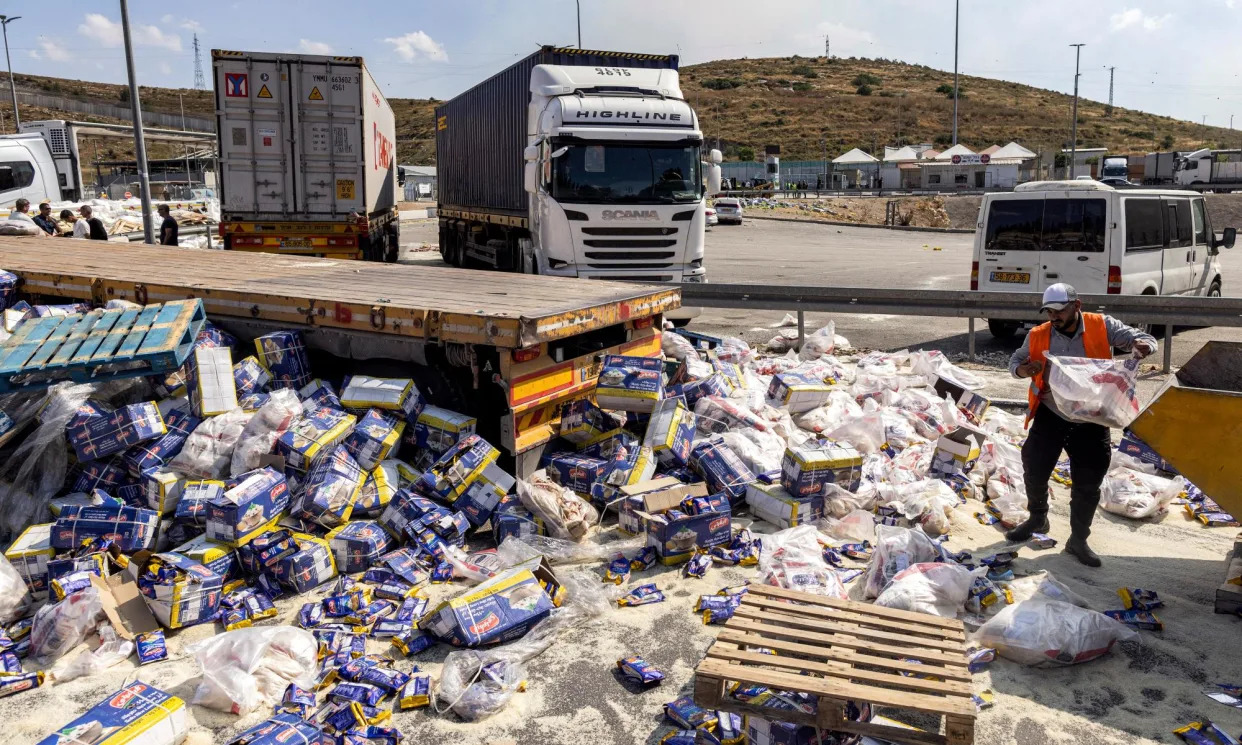
A worker clears piles of spilled food parcels scattered across the ground in a lorry park.Photograph: Oren Ziv/AFP/Getty Images
Palestinian lorry drivers delivering aid to Gaza have described “barbaric” scenes after their vehicles were blocked and vandalised by Israeli settlers, preventing humanitarian supplies reaching the territory where much of the population face imminent starvation.
Drivers and contractors who were targeted on Monday at the Tarqumiya checkpoint in the occupied West Bank also said Israeli soldiers escorting the convoy did nothing to stop the attack.
The incident sparked international condemnation after videos emerged on social media that appeared to show Israeli settlers throwing boxes of much-needed supplies on the ground and at least one vehicle being set ablaze.
Yazid al-Zoubi, 26, said between 50 and 60 lorries had set out in the convoy.
“We were carrying oil, sugar and other things and driving from the Tarqumiya crossing,” he said. “We left in a convoy with an army vehicle in front of us and an army vehicle behind us, and we took a special army road that civilians could not cross. Suddenly, after 20 minutes on the road, near the crossing, we were surprised by at least 400 settlers. They attacked us. The rest of the drivers and I escaped from the vehicles after the settlers starting throwing stones at us.’’
Zoubi said the situation escalated when the settlers started breaking the windscreens of the lorries and piercing the tyres, then climbed on to the vehicles and threw packages of food into the road.
Aid agencies have described famine conditions in parts of Gazathat they have said have been caused by Israeli restrictions on aid entering the Palestinian territory. Humanitarian officials say the population of Gaza needs at least 500 daily lorryloads of food, fuel and other essentials but have received a fraction of that amount.
Zoubi said that during Monday’s attack the Israeli soldiers escorting the convoy stood back and watched as the settlers rampaged.
“We are shocked and surprised that the army did not provide us with any kind of protection,” he said. “Even though they were present and watching what was happening. The army was at the service of the settlers.’’
Zoubi said the drivers fled the scene but that when they returned later to retrieve their belongings, they were attacked by the settlers, some of whom were armed.
‘’At that point the army gathered us and ordered us to raise our hands on the walls,” he said. “The settlers were free to terrorise us. I have never been attacked so brutally before.
“The state of terror I experienced is indescribable. Even now I have nightmares at night. My psychological state is broken, I cannot think properly, I can’t sleep. I cannot work. We are not smugglers. We agreed to transport goods legally from the crossing under the watch and supervision of the Israeli authorities.”
Footage of the incident appears to show the Israeli soldiers taking no action against the settlers.
Haitham abu Khairo was also part of the aid convoy and the owner of one the lorries vandalised. He said he had lost approximately 250,000 Israeli shekels (£53,700) in the attack, which came after several trouble-free trips transporting aid for Gaza across the West Bank and Israel from the Jordanian border.
“I managed to escape but what happened is serious. The Israeli government must punish those who commit such an act with the most severe punishment. Because it will affect the country’s economy in the future, as many truck drivers will leave their jobs to ensure their safety,” he said.
The violence has prompted dozens of Palestinian drivers to refuse to transport supplies to Gaza. Adel Amer, a member of a hauliers’ union based in the West Bank, told Reuters about 15 lorries had been damaged in the attack and that the total damage amounted to about £1.6m.
Monday’s attack sparked strong condemnation from Israel’s allies. The US national security adviser, Jake Sullivan, described the incident as a “total outrage” while the UK foreign secretary, David Cameron, said it was “appalling”.
This month, the UK and EU imposed sanctions against Israeli settlers including some accused of violence towards Palestinians on the West Bank. The US has imposed sanctions on a handful of individuals and organisations linked to attacks on Palestinian civilians, with measures first announced in February then expanded twice in March and April.
The Israeli police said the incident, in which several people were arrested, was being investigated.
The Israeli military said it had worked throughout the seven-month war “to allow and facilitate the entry and delivery of extensive humanitarian aid to the Gaza Strip, out of its commitment to international humanitarian law”.
It added: “Each incident involving humanitarian aid convoys, facilities or personnel is being thoroughly examined, including those mentioned in the report, and according to the examination’s findings, lessons are learned and implemented in order to prevent reoccurrence of such incidents and if so required, command, disciplinary and other measures are taken against individuals responsible.”
Monday’s attack was claimed by a group calling itself Order 9, which said it had acted to stop supplies reaching Hamas and accused the Israeli government of giving “gifts” to the Islamist group.
It was not the first time that Israeli settlers have tried to stop the flow of aid to Gaza. Last week, demonstrators blocked a road near the desert town of Mitzpe Ramon to protest against the delivery of aid lorries into Gaza.
This year, there were frequent demonstrations at crossings from Israel into Gaza, which hindered aid shipments into the territory. In March, the international court of justice ordered Israel to allow unimpeded access of food aid into Gaza.
• The second video embedded in this article was amended on 16 May 2024. An earlier version said that a convoy of around 50 trucks carrying oil, sugar and other supplies was attacked by Israeli soldiers; this should have said Israeli settlers.Un.org
www.un.org/unispal/document/human-rights-council-hears-that-700000-israeli-settlers-are-living-illegally-in-the-occupied-west-bank-meeting-summary-excerpts/

A worker clears piles of spilled food parcels scattered across the ground in a lorry park.Photograph: Oren Ziv/AFP/Getty Images
Palestinian lorry drivers delivering aid to Gaza have described “barbaric” scenes after their vehicles were blocked and vandalised by Israeli settlers, preventing humanitarian supplies reaching the territory where much of the population face imminent starvation.
Drivers and contractors who were targeted on Monday at the Tarqumiya checkpoint in the occupied West Bank also said Israeli soldiers escorting the convoy did nothing to stop the attack.
The incident sparked international condemnation after videos emerged on social media that appeared to show Israeli settlers throwing boxes of much-needed supplies on the ground and at least one vehicle being set ablaze.
Yazid al-Zoubi, 26, said between 50 and 60 lorries had set out in the convoy.
“We were carrying oil, sugar and other things and driving from the Tarqumiya crossing,” he said. “We left in a convoy with an army vehicle in front of us and an army vehicle behind us, and we took a special army road that civilians could not cross. Suddenly, after 20 minutes on the road, near the crossing, we were surprised by at least 400 settlers. They attacked us. The rest of the drivers and I escaped from the vehicles after the settlers starting throwing stones at us.’’
Zoubi said the situation escalated when the settlers started breaking the windscreens of the lorries and piercing the tyres, then climbed on to the vehicles and threw packages of food into the road.
Aid agencies have described famine conditions in parts of Gazathat they have said have been caused by Israeli restrictions on aid entering the Palestinian territory. Humanitarian officials say the population of Gaza needs at least 500 daily lorryloads of food, fuel and other essentials but have received a fraction of that amount.
Zoubi said that during Monday’s attack the Israeli soldiers escorting the convoy stood back and watched as the settlers rampaged.
“We are shocked and surprised that the army did not provide us with any kind of protection,” he said. “Even though they were present and watching what was happening. The army was at the service of the settlers.’’
Zoubi said the drivers fled the scene but that when they returned later to retrieve their belongings, they were attacked by the settlers, some of whom were armed.
‘’At that point the army gathered us and ordered us to raise our hands on the walls,” he said. “The settlers were free to terrorise us. I have never been attacked so brutally before.
“The state of terror I experienced is indescribable. Even now I have nightmares at night. My psychological state is broken, I cannot think properly, I can’t sleep. I cannot work. We are not smugglers. We agreed to transport goods legally from the crossing under the watch and supervision of the Israeli authorities.”
Footage of the incident appears to show the Israeli soldiers taking no action against the settlers.
Haitham abu Khairo was also part of the aid convoy and the owner of one the lorries vandalised. He said he had lost approximately 250,000 Israeli shekels (£53,700) in the attack, which came after several trouble-free trips transporting aid for Gaza across the West Bank and Israel from the Jordanian border.
“I managed to escape but what happened is serious. The Israeli government must punish those who commit such an act with the most severe punishment. Because it will affect the country’s economy in the future, as many truck drivers will leave their jobs to ensure their safety,” he said.
The violence has prompted dozens of Palestinian drivers to refuse to transport supplies to Gaza. Adel Amer, a member of a hauliers’ union based in the West Bank, told Reuters about 15 lorries had been damaged in the attack and that the total damage amounted to about £1.6m.
Monday’s attack sparked strong condemnation from Israel’s allies. The US national security adviser, Jake Sullivan, described the incident as a “total outrage” while the UK foreign secretary, David Cameron, said it was “appalling”.
This month, the UK and EU imposed sanctions against Israeli settlers including some accused of violence towards Palestinians on the West Bank. The US has imposed sanctions on a handful of individuals and organisations linked to attacks on Palestinian civilians, with measures first announced in February then expanded twice in March and April.
The Israeli police said the incident, in which several people were arrested, was being investigated.
The Israeli military said it had worked throughout the seven-month war “to allow and facilitate the entry and delivery of extensive humanitarian aid to the Gaza Strip, out of its commitment to international humanitarian law”.
It added: “Each incident involving humanitarian aid convoys, facilities or personnel is being thoroughly examined, including those mentioned in the report, and according to the examination’s findings, lessons are learned and implemented in order to prevent reoccurrence of such incidents and if so required, command, disciplinary and other measures are taken against individuals responsible.”
Monday’s attack was claimed by a group calling itself Order 9, which said it had acted to stop supplies reaching Hamas and accused the Israeli government of giving “gifts” to the Islamist group.
It was not the first time that Israeli settlers have tried to stop the flow of aid to Gaza. Last week, demonstrators blocked a road near the desert town of Mitzpe Ramon to protest against the delivery of aid lorries into Gaza.
This year, there were frequent demonstrations at crossings from Israel into Gaza, which hindered aid shipments into the territory. In March, the international court of justice ordered Israel to allow unimpeded access of food aid into Gaza.
• The second video embedded in this article was amended on 16 May 2024. An earlier version said that a convoy of around 50 trucks carrying oil, sugar and other supplies was attacked by Israeli soldiers; this should have said Israeli settlers.Un.org
www.un.org/unispal/document/human-rights-council-hears-that-700000-israeli-settlers-are-living-illegally-in-the-occupied-west-bank-meeting-summary-excerpts/
*** Human Rights Council Hears that 700,000 Israeli Settlers are Living ...
Mar 28, 2023 ... These settlers lived illegally in 279 Israeli settlements across the occupied West Bank, including 14 settlements in the occupied East ...
No comments:
Post a Comment